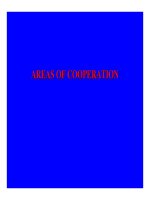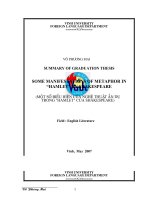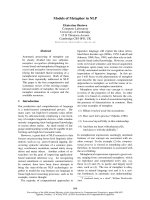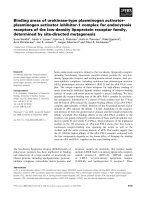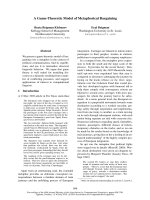Areas of Metaphor
Bạn đang xem bản rút gọn của tài liệu. Xem và tải ngay bản đầy đủ của tài liệu tại đây (1.13 MB, 26 trang )
SECTION 1
Areas of Metaphor
Some ideas are small and very particular. Other ideas are big.
They bring lots of related ideas to mind. For example, we all
know what a 'coin' is. It is a small piece of metal which we use
to pay for things. It is a part of a much bigger idea - 'money'.
When we think of money we think of saving it, earning it,
wasting it, spending it, being generous with it, being mean with
it. Money is a bigger idea than coins or banknotes. When we use
the common metaphor - time is money - we know what we
mean. Many of the words we use with money, we also use with
time:
We have time to spare.
We waste time.
We spend time doing something.
We run out of time.
We save time.
In this section you will learn about 12 important metaphors
which cover major areas of English.
11
1: Literal meanings
We spend money. We spend time doing something. We even spend a lot of time
spending money! The idea that time is money is very common. Here are 16
sentences - 8 literal and 8 metaphorical. Write the metaphorical sentence under
the one with the literal meaning:
a. Could you spare 5 minutes for a chat?
b. 40 minutes waiting for a bus! What a waste of time!
c. It's worth spending at least two days in Oxford.
d. You'll have to finish now. We've run out of time.
e. I'm busy today, but I can make time for you tomorrow afternoon.
f. Let's get a taxi. It'll save at least 20 minutes.
g. Venice is definitely worth a whole week.
h. I'm so busy at work. I can't afford more than a week off at a time.
1. I spent over £100 today.
2. I've been trying to save at least £10 a week all year.
3. £2000 for a holiday! What a waste of money!
4. Can you spare me 50p for a cup of tea?
5. I could manage £70 a week, but I simply can't afford £100 for a flat.
6. I've run out of cash. Is there a cash machine anywhere near here?
7. Buy a second-hand car. New ones just aren't worth the money.
8. We made over a thousand pounds at our Christmas Fair.
Note: You can say He spent his life working for the poor.
12
2: Spending time
Fill in one of the following words in each space to complete the idioms:
afford waste (verb) plenty make
save ran out of spare waste (noun)
value short of precious spend
1. I've had to go the doctor about my eyes. I at least 6 hours a day
in front of my computer.
2. If you want to get to college quicker, time: don't drive, buy a bike!
3. I don't get home till 10 o'clock every night, so I the free time I have
at weekends.
4. If you're thinking of going to see the new Bond movie, don't bother. It's a
of time.
5. Sorry I wasn't able to get that book for you. I just time.
6. Can you a minute or two? I just want to ask you something.
7. I'm sorry I can't the time right now. I've got a plane to catch.
8. I work long hours so the time I spend with my family is very to me.
9. I hate airports. You so much time just queuing!
10. I think we should hurry up. We're time.
11. There's
of time. Don't worry! The train doesn't leave for an hour.
12. There's no way I can the time to see you before the end of the week.
3: Revision
Complete these common expressions with words from this unit:
1.1 seem to all my time dealing with other people's mistakes.
2. I'm sorry I just can't the time at the moment.
3. Could you me a minute or two?
4. Stop your time! Get on with your work.
5. Why not ring the helpline? It'll you hours trying to solve the problem
on your own.
6. We'd better get a taxi to the station. We're of time.
Are you well-organised or do you waste a lot of time?
1: Literal meanings
In business many words are used which come from the area of fighting and war.
Use the following words to complete the definitions below:
minefields battle captures march
casualties targets flak bombard
sights surrounded reinforcements forces
1. The worst weapon used against civilians is the mine. The campaign by Princess
Diana made the clearing of an international priority.
2. When one side takes prisoners, it them.
3. Nelson was killed at the of Trafalgar.
4. Left, right, left, right. Learning to properly - in step with others
- is one of the first things you have to learn when you train as a soldier.
5. People who are killed or wounded during a battle are
6. When you learn to shoot, at first you use circular After a while.
you learn to shoot at in the shape of people.
7. If you shoot from the ground at aircraft, you use shells known as
8. If you shell a place for a very long time without stopping, you it.
9. You aim a rifle by looking through the
10. The Army, Navy, and Air Force are normally called the armed
11. If you need extra troops, they are called
12. If you have completely encircled your enemy, you have him.
2: Gaining ground
Use the following words and expressions
to complete these sentences:
reinforce
surrounded
gaining ground on
bombarded
joined forces
give up without a fight
1. Sales are up! That means we're definitely our
main competitors. They'll soon be trying to take us over!
2. It looks as if we are going to be closed down. We don't want to
so why don't we try to organise a management buy-out?
3. Our image is too old-fashioned. We need to modernise our product range in order
to our market position. Otherwise, we'll lose it!
4. It was obvious that Smiths would close down. They were by
big modern supermarkets with more buying power.
5. In order to expand in the Middle East, we've with
a company who have been working successfully in the region for over 20 years.
6. The new advertising campaign has been a huge success. We've been
with thousands of new enquiries.
14
3: Keep your head down
Fill in the following words and expressions in the sentences below:
a. minefield f. taken a lot of flak
b. capture g. casualties
c. targets h. own worst enemy
d. marching orders i. set our sights on
e. keep your head down j. battle
1.I think the boss is in a bad mood. Just get on with your work and
2. We have a 10% increase in turnover this year.
3. Promotions and Marketing are having their usual with the
Finance Director over next year's advertising budget.
4. If you park in the Manager's space, you'll soon get your !
5. Luke was late again this morning. He's brilliant at his job, but if he's not careful,
he'll get the sack. He's his
6. If you don't set , you never know if you haven't achieved them!
7. Exporting to some countries can be a - corrupt customs officials,
endless paperwork and red tape, and slow communications.
8. Because we had to lay off 500 people, we've in the press.
9. We need a more aggressive marketing policy if we want to a
bigger share of the market. Look at Nike. They're everywhere!
10. Small businesses are always the first in a recession.
4: Revision
Fill in the missing verbs to complete these idioms:
1 ground
2 targets
3 market share
4 your sights on
5 up without a fight
6 your market position
7 a lot of flak
8 forces with
Do you know someone who is his/her own worst enemy?
15
1: Literal meanings
We use the verb see in English to mean with our eyes, but also to mean
understand. We say Seeing is believing and I see what you mean. Complete the
following definitions with these words:
view hindsight mud wide
blinkers short-sighted eye-opener sight
1. If your eyes are very open they are open.
2. Something which is very surprising is often called an
3 is when you understand something in the past because of new
things you have learned.
4. To make horses go in a straight line without looking to either side, they are fitted
with so that they can only see straight ahead.
5. Very wet earth is called
6 people cannot see things which are far away.
7. If something disappears along a road, eventually you lose of it.
8. You usually get a good of the surrounding countryside from the
top of a hill.
2: See the point
Use the following words to complete the sentences below:
a. see past the end of his nose
b. made myself perfectly clear
c. opened your eyes
d. saw through
e. through my eyes
f. saw reason
g. eyes wide open
h. see the point
1. Why do you want me to complain? I can't
2. I thought I'd , but I still ended up with the
mushroom pizza when I ordered the ham and mushroom!
3. Try to see the situation I simply can't afford
to spend £1,000 on a holiday.
4. Jane and Fred are both in their forties so they're going into marriage with their
5. It took a long time to persuade Pete, but he finally
6. My boss is really selfish and small-minded. He can't
7. Look, you need to change your job. They're paying you peanuts! They make you
work all hours. It's time you and looked for
something better.
8. I knew all Justin's stories were exaggerated. I him
the first time I met him.
16
3: A real eye-opener
Match the two parts of the dialogues below:
1. Why doesn't Steve ever listen to other people's point of view?
2. Did you see the way Simon spoke to his wife?
3. Not you again! What do YOU want?
4. We should never have bought this car. It's been nothing but trouble.
5. Oh, so you didn't know that Jill got the job because her dad knows the Director.
6. These instructions are incomprehensible.
a. > Yes. It was a real eye-opener, wasn't it? I never knew he could get so angry!
b. > It's easy to say that with hindsight.
c. > Because he's blinkered, that's why.
d. > Ah! Now I get the picture.
e. > Let me have a look. Yes, I see what you mean.
f. > I want to clear up the misunderstanding we had earlier.
Note: Another way of saying with hindsight is in retrospect.
4: As clear as mud
Put the words in italics in the correct order:
1. I can never understand his explanations, can you?
> No. They're
(as mud as clear)
2. So I think we should keep the women-only policy.
> Isn't that a ?
(view short-sighted very)
3. There are so many possibilities. We could also develop a new —
> Stop. Slow down. Don't our aims.
(lose of sight)
4. Don't worry. It's not really a problem.
> Well, it is
(my from view point of)
5. Management are giving the smokers their own room.
> At last. They've
(the seen light)
6. What exactly does he want us to do?
> I don't know. Ask him again
(It's very not clear)
7. So you add these figures to those and that's how you get this total.
> Ah, now
(what I mean you see)
Have you ever gone into something with your eyes wide open, but regretted it
with hindsight?
17
1: Literal meanings
Many of the words we normally use to talk about going places are used to talk
about life - as a journey. Complete the following sentences with these words:
short-cut take off rails dead-end crossroads
tunnel ruts track footsteps steam
1. At Heathrow planes and land every minute.
2. Do you think there will ever be a between southern Spain and
North Africa?
3. The road up to her house has no surface and in the middle of winter it gets
full of
4. It's really difficult finding the way to her house. She lives in the country, five
miles from the nearest town, down a lane off the main road, and then up a little
past an old ruined church.
5. When you get to the , take the road to the left, heading for Oxford.
6. Before the days of diesel and electric trains, there was only
7. A train came off the just outside York station and 3 people were
killed.
8. Sh! Listen! Can't you hear the sound of outside?
9. The police caught the 15-year-old boy who stole my car when he drove up a
street which turned out to be a
10. When we were small, we used to take a over the fields to school,
but now they've built a housing estate on the farm.
2: In a rut
Use the following expressions to complete the sentences below:
a. in a rut e. light at the end of the tunnel
b. coming or going f. go our separate ways
c. short-cut to success g. on the road to recovery
d. side-tracked h. taken off
1. I've been doing the same job for 15 years. I think I'm
I need a change.
2. I've got so much work on my desk. I'm really confused. I don't know whether
I'm
3. It's been a very difficult year, but I'm happy to say there now seems to be
some
4. Our partnership didn't last. In the end we agreed to
5. Hard work, long hours, and lots of worry. When you are trying to build up a
business, I'm afraid there's no
6. I'm feeling much better now thanks. I'm well
7. Sorry it took so long. I got
8. She's getting frustrated. Her career hasn't really yet.
18
3: No turning back
Use the following words to complete the sentences below:
a. at a crossroads e. a dead-end job
b. right off the rails f. going nowhere fast
c. no turning back g. running out of steam
d. follow in his father's footsteps h. arrived
1. Once you've made your decision, you realise there's ,
don't you?
2. I can't make up my mind. It's either stay where I am or apply for a job abroad.
I seem to be in my present job.
3. His father's a doctor and it's obvious Harry's going to
4. I'm doing my best, but everything I do seems to involve ringing someone who's
either on holiday this week or out of the office. I feel as if I'm
5. Bill's wife died last year. I'm afraid he just hasn't come to terms with it yet. And
now he's started drinking. I'm afraid he's just gone
6. There's no prospect of promotion. I'm in
7. Now he's been given a company car, he thinks he's really !
8. I just don't have the enthusiasm I used to have. I'm
4: Going nowhere fast
Using idioms from this unit, complete
the following dialogues. A key word is
given for each.
1. How are you getting on with your assignment?
> Terrible. I'm (nowhere)
2. What's Mark going to do after his college course?
> No doubt (footsteps)
3. It's a huge decision, you know.
> I know. And (turning)
4. Are you and Delia still together?
> No. We've (separate)
5. How's your dad?
> Much better (recovery)
6. I'm sorry to hear Katy's still in hospital.
> Yes. It's been a long time, but there's (tunnel)
7. The full course takes 5 years, I'm afraid.
> Oh, I realise that. I know there's (cut)
8. Are you making much progress?
> Yes, we're getting there slowly, but we're (steam)
9. So, you're now European Sales Manager - and not yet 30!
> Yes, I suppose my career really has (off)
10. You look a bit harassed. Is everything all right?
> To tell you the truth, I don't know whether (going)
Are you in a rut? If so, are you going to do anything about it?
19
1: Literal meanings
Because life is full of uncertainties, we often talk about it in the same way we talk
about gambling - horse racing and card games, for example. Complete the
following definitions with the words below:
jackpot toss sleeve
hand stake chips
deals odds bluff
1. If you get three aces when you are playing poker, you probably have a winning
2. Before a football match, the captains a coin to see who will start
the game.
3. The in favour of winning the National Lottery are about 14 million to one.
4. When you are playing cards, one person the cards to the other players.
5. The top prize you can win in a lottery is the
6. The money that you gamble on a horse, for example, is a
7. If you when playing cards, you pretend to have a better
than you actually have. If you your way, it means that you pretend to
know a lot about something when, in fact, you know very little.
8. In a casino, you don't use money; you use
2: A lousy hand
Complete the dialogues with the following words and expressions:
a. a bit of a gamble d. play your cards right
b. a lousy hand e. I wouldn't put money on it
c. something up your sleeve f. the chips are down
1. Jim's been made redundant again. He's had no luck at all in the last ten years.
> You're right. If you ask me, he's been dealt
2. There's no way we can afford to go on holiday this year.
> Don't worry. I've got an idea I haven't told you about yet.
Thank goodness you've always got !
3. I've decided to give up my job and go self-employed.
> Well, good luck! Working for yourself can be
4. I've just got a job at Mexy's.
> Congratulations. They're a good company to work for. If you
, you'll do very well there.
5. I think the company is having a bad year, from what I've heard.
> Well, we'll just have to work that bit harder. We usually do when
6. I hope the weather clears up by the weekend. I've promised I'll take the kids on
a picnic.
> if I were you! You know what it can be
like at this time of year.
20

